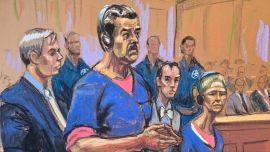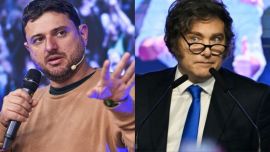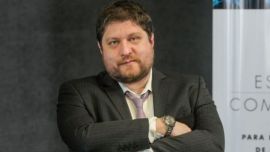Last December 10, Norberto Milei was about to witness something he had never imagined. His son – whom he had tortured for decades with hurtful words such as “useless,” “rubbish” and “failure” and punished by savagely beating him – was about to become President before his very eyes.
‘Beto’ is no longer the man he used to be. No longer is he known ‘el gordo,’ as they called him in the 1990s, when he inspired respect and fear within his world of urban transport businessman from the rapid and unscrupulous way he had moved from being a bus-driver to managing a fleet of hundreds of buses in record time. But those times went by some while ago. Various things changed.
When Javier Milei was inaugurated as Argentina's head of state, Norberto’s silhouette was seen from a Congress balcony looking somewhat deflated. In 2013, he underwent a gastric bypass at the Fundación Favaloro which, in his words, shrank “everything except his head.” Nor have his 81 years gone by without leaving their mark; his health is far from being optimal. In 2021 trying to change a tyre of his car almost cost him his life – he fell, broke a hip and ended up in hospital.
The biggest change has occurred within the family unit. Those spring days last November and December, after decades of alienation and years without exchanging a word, seemed to repair the bond with his firstborn. Norberto was at the Hotel Libertador bunker on the night Javier won the run-off. He went to see his offspring don the presidential sash. The photos of Norberto in Congress, together with his wife Alicia Lucich, flashed rapidly throughout all the media.
But that is barely a linear reading of what happened that December 10 when the idea of a family reunited, after long years of differences, was installed. Like everything happening around Milei, the truth tends to be more twisted and complex. A fact to prove it – Javier did not invite his parents to his inauguration nor afterwards to the Teatro Colón, where he asked Raúl Lavié to sing ‘Balada para un loco,’ a nod to the epithet which his father had slapped on him since childhood to justify his violence against him and which afterwards has stalked him in the form of his nickname.
“They’ve called me 'el loco' so often, well, here you have him,” explained the President as to his musical choice later on. Might his father have been one of those at whom the song was aimed? Was it a kind of delayed personal revenge?
It’s hard to know although one thing is for sure – from his PASO primary victory in August up to when this article was written, the La Libertad Avanza leader has not thanked his father once, not even mentioning him in public. And not just that – early in March Norberto was hospitalised at the Sanatorio Otamendi for anaemia and his son did not visit him.
Karina Milei, in contrast, differs from her brother in several ways. It was indeed she who took their parents to the box seats on inauguration day, ensuring that the invitation reached them and that they were present.
Unlike her elder brother, the presidential chief-of-staff has never been distanced from her parents – indeed, she is so close to them that she participated in various family businesses.
Karina took full advantage of the meteoric rise of ‘el gordo,’ which was shady and sinuous and which included multi-million properties in the United States and even losing a trial for tax evasion.
Anything might happen in the life of Milei’s unknown father.
Lineage
Horacio Norberto Milei was born on September 18, 1942, just nine months before the coup bringing Juan Domingo Perón into government. His early years are a mystery lost in time and his son, prone to publicising much of his life, always chose not to give them too much importance. Indeed, during his first years of media exposure, the economist preferred to speak of him as his “progenitor,” often with tears in his eyes as he recalled the physical abuse and blows suffered as a child.
Yet some things are known about Norberto – his climb up the socio-economic ladder was in four steps, literally. He began working when young as a bus-driver for the Route 21 line, which runs along the General Paz avenue to this day. That forged part of his personality.
“He was a big, robust guy, very fast and very smart and also screwed-up. You could see that his time as a bus-driver had toughened him, making him think that you advanced in life by hitting and squeezing people. And you also see how that led to violence at home” says Eduardo Vacirca, a lawyer who was a partner of Milei Senior from 2016 until the pandemic, working for an important business in Vicente López.
‘Beto’ was the one moving the money from the sale of second-hand cars beyond state scrutiny, according to the narrative of Vacirca.

How Norberto passed from driving a bus to owning that Route 21 line is truly a mystery. The official story, repeated by President Milei, is that the man worked weekends and public holidays (even at Christmas, which he never spent with his children), gathering the necessary money to make the social leap and acquire in the early 1990s Teniente General Roca SA, the company which controlled the 21 and 108 lines.
The old powers that be in the world of urban transport recall that, in those years, Norberto clashed with Ángel Faijá, the owner of DOTA (the giant which today controls 180 lines of the Buenos Aires Metropolitan Area), who wanted to take over the company owned by the President’s father. But a business friendship ended up being born out of that tussle – in the mid-1990s together would acquire half of Rocaraza SA, coming to control the 31 and 146 lines.
Fast and fearless and quick on the uptake, as those dealing with him recall, Milei Senior moved forward, taking another unexpected turn in his business life in 2004.
While continuing to run bus lines, he became in that year president of Francisco Viedma SA, a company far removed from the world in which he had operated all his life. Until then, it was a financial house.
“Its activities include investment in shares and bonds, stockbroking, securitisation, etc.” reads the firm’s registration with AFIP tax bureau.
That was not to be, however, his last business fling. The year 2007 was Norbverto’s time to go rural, acquiring Buena Yunta SA, dedicated to cattle-breeding and agriculture, followed the next year by Campo La Ponderosa SA, a firm growing cotton, wheat and maize.
But Milei Senior had yet another surprise in store. Perhaps buses already bored him, as did the tedious financial world and the tough farming business.
In 2011 he started raiding another universe and set up the real-estate company Graviar SRL – “the purchase, sale, rental and lease of real-estate property,” ran its registration.
Ascent
“If thieves walk down the street and honest citizens along the pavement, 'Beto' moved along the curb,” assures Vacirca.
There are various rough edges in the career of Milei Senior. On August 14, 2008, a court found him guilty of not paying taxes on the basis of a lawsuit lodged by the Dirección de Fiscalización del Área Metropolitana, a department of Buenos Aires Province’s Dirección Provincial de Rentas tax office (today ARBA in its Spanish acronym), which had discovered that Teniente General Roca SA, one of his transport companies, had not paid taxes in 2002 and 2003.
The sum which Norberto had “forgotten” to pay to the state was 99,280 pesos, which together with a 20 percent fine of 19,280 pesos totalled a liability of 118,560 pesos (which today would be worth over 20 million pesos). In any event the President would undoubtedly say that his father was a hero, as he recently described businessmen who dodge taxation.
The other striking stage of his career is Milei Senior’s experience as the director of two offshore societies in Miami.
Alkary Investments LLC was created on January 14, 2015, and Alkanor Investments LLC on September 20, 2019. In both cases his wife and daughter figure on the board of directors. Might that be the origin of the names? “Alkary” combines Alicia and Karina, and “Alkanor” Alicia, Karina and Norberto.
The former firm was the more active, coming to own four flats. As published by La Nación and elDiarioAR.com earlier this month, in a project coordinated by the CLIP (Centro Latinoamericano de Investigación Periodística) regional investigative journalism centre, Alkary bought at least four luxury condo flats for around US$2.7 million between 2018 and 2019.
Presidential Spokesperson Manuel Adorni says the funds for that purchase came from the “sale of the companies of Norberto Milei,” with the idea of renting out property but the pandemic complicated those plans. That venture ended turbulently – seeing that the ends did not meet, the Mileis stopped paying on the four mortgages sustaining that acquisition and ended up being sued.
The problems ended when the Mileis sold off the properties for US$2.3 million and cancelled the debts on which they had defaulted, an operation which they did not declare with the AFIP tax bureau and which happened in 2022 when Javier Milei was already a national deputy.
Happy ending?
At this stage of the Milei Presidency the libertarian’s opinion of Perfil and its publishing house is well-known, but what is less known is what happened on one of the last times we managed to have a dialogue with him.
That was in April, 2021, in the midst of the midterm campaign. Noticias was preparing a cover story (with the title ‘El peligroso éxito de la antipolítica,’ or “The dangerous success of anti-politics”) and the libertarian was to be a protagonist at a time when the ‘círculo rojo’ establishment treated him as a joke).
We were arranging an interview with photographs. Javier Milei, however, never showed up at the agreed time. My telephone then rang: “I apologise 1,000 times but my old man has just had an accident. The idiot wanted to pretend that he is young and change a wheel on his car and almost killed himself. My sister is taking him to hospital.” Our meeting never took place.
That moment was the closest to family unity the Mileis ever came and it was all the merit of Karina. She had seen her brother looking so bad in 2020 during the pandemic that she had taken him to live with their parents, returning to the family home. In that year and through to the end of 2021 the family was more united than ever and it was in his father’s house where Javier ended up deciding to enter politics.
Today Norberto and his son would not seem to be similarly aligned. It is probable that within this complex story of blows but also rapprochements, there will be more chapters to come.

A COMPLICATED FAMILY
-
Norberto was a bus-driver on the 21 line but in double-quick time he became the owner of a financial house, a real-estate firm and two farms.
-
He also had property in the United States which he managed with Karina. That venture ended in lawsuits.
-
Now he is a pensioner who does not usually appear in public. In 2021 he had a serious accident.
EDUARDO VACIRCA: ‘Beto was a screwed-up guy’
Eduardo Vacirca directs his own law office and has three law chairs in the University of Buenos Aires. He also had a past with the Unión Cívica Radical.
Between 2016 and the Covid-19 pandemic, he worked together with Norberto Milei. Both were part of a quartet operating in an important real-estate office in Vicente López. Vacirca took care of the legal side while the task of ‘Beto,’ as they called him, was somewhat less transparent.
According to Vacirca, the President’s father was in charge of “moving” the money earned in the purchase and sale of second-hand cars beyond state scrutiny and “putting it to work.” According to this account, Norberto was in charge of boosting and saving the earnings obtained: he purchased flats and invested in mutual funds and anything which would best permit him to elude the requirements of the tax system.
“Norberto was very quick on the uptake, he thought that you advanced in life by hitting and squeezing people. And you can see that’s what led to violence in his house,” recalls the lawyer Vacirca, relating that as from 2018, the media appearances of Norberto’s son began to surface in their usual chats. It was a thorny issue because at that time the economist would tell the media how his father had tortured and beat him for years.
“He was crazy, wild, vehement and very rebellious, which is why I had to beat him up,” is what Norberto responded when asked about his firstborn, Vacirca says.
“That’s why 'Beto' took charge of situations when they got a bit complicated. He was the best [of us] for that. For example, somebody who was owed around five million pesos came along, [and] 'Beto' told him: ‘We’ll give you two [million] or nothing,’ getting very tough and the guy ended up accepting the two million. He handled negotiations violently and had no problems being the tough guy and squeezing people. He was rough,” says Vacirca.
Since the pandemic they have only seen each other once and have lost contact since then.
FAMILY & POWER: OTHER DYSFUNCTIONAL CASES
Javier Milei is not the only head of government to have a complex relationship with his father. It would seem that in the world of power, dysfunctional families are more normal than you might think.
A very well-known case in Argentina is the bond uniting Mauricio and Franco Macri. The father of the PRO founder always had a very bad relationship with his son, making his life impossible in his stage as a businessman and dedicating several hurtful commentaries after he took his jump into politics.
In 2017, Noticias magazine was the protagonist of one of those family clashes, publishing a cover story written by José Antonio Díaz with the headline: “I’d like the next president to come from La Cámpora,” and attributing it to Franco Macri.
“My father was the person who boycotted me most in my life,” Mauricio came to say. Those who knew the family even tell a legend: that Franco liked to call his son ‘boludito,’ or “little idiot” with people present as a way of humiliating him in front of others.
Franco died in 2019 and in the last years of his life, iti would seem that father and son drew a little closer. Indeed, the ex-president was working on a biography of his father, which has yet to appear. One curious fact: his cousin Jorge, today Buenos Aires City Mayor, also had a complex relationship with his father Antonio, Franco’s Italian brother.
In the case of former US president Donald Trump, something similar happened. Mary Trump, the niece of the former president of the United States, in a book titled Too Much and Never Enough: How My Family Created the World’s Most Dangerous Man details how Donald’s father was not easy to deal with. Fred Trump was a controversial real-estate developer about whom it was said, according to the denunciations against him in the 1970s, that he would not give work to any blacks or Latinos.
According to the book written by Trump’s niece, Fred never made Donald feel “loved or self-assured or valued or reflected.” In fact, there is one famous anecdote in the United States which is often repeated – that Fred obliged Donald to look at himself in the mirror every day before leaving the house and say to himself: “I’m a king, I’m a killer.”
Perhaps this explains the personality of Joe Biden’s challenger in November’s presidential elections.
It can thus be seen that the case of Javier and Norberto Milei is not unique in history.


























Comments